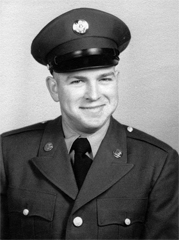

Norbert Stoberl, youngest son of Anton and Clara Stoberl of rural Manning, was the first of his family to serve in the military. He received his draft notice in late 1957, and left for basic training just nine days after his December 28 wedding to Virginia Jorgensen of Audubon. He and two other Carroll County men left Carroll by bus for Omaha January 9, 1958, then by train to Fort Carson, Colorado Springs, Colorado. They were among 592 Carroll County men inducted in the service between 1950 and early 1959.
A 1953 graduate of Manning High School, Norb was 22 when he entered the Army. He had been farming with his dad and when his dad died in 1955, continued farming with his brother.
At Fort Carson, he took his basic and combat training with Company B Battle Group, 5th Infantry Division. Norb earned the Expert Rifleman award and was one of 5 of the more than 200 men in his company to be honored with a 3-day pass which is normally not given during basic training. His wife, mother, brother Reuben and his family visited Norb at the end of February. He remembers his basic training as a time of learning to be sensible and responsible, and feels all young people could benefit by similar training.
After basic training and a leave home, Norb was sent to Fort Bliss, El Paso, Texas. Assigned to Company B of the 5th Infantry Division, their 700-member unit had originally worked with the Nike-Ajax missile system and were now to receive transition training on the new Nike-Hercules system. The Nike-Hercules was a supersonic anti-aircraft missile capable of seeking out enemy aircraft with either nuclear or conventional warheads at a range of more than 75 miles.
While Norb participated in training every day, at night he was receiving private training on how to shoot off the Nike-Hercules. The strain of the all day/all night training was noticed by Head Cook Neil Smith, who told Norb about a job opening up as a cook. Norb and another soldier volunteered; after their trial period, Norb earned the position of cook assistant but the other one didn't. Norb credited his success at being named to the position to his mother Clara, who made sure her four sons all knew how to cook. The sergeant??? training him on the Nike-Hercules wasn't happy to lose Norb, telling him "I was planning to send you to school".
Cooking for 700 soldiers every day, first at Fort Bliss and then overseas, was more than a fulltime job. There were 5-6 cooks on two shifts. The night shift was 6 pm to 3 am; the day shift from about 4 am to after 6 pm. Meals were determined by the Mess Sergeant, who ordered the materials. The night shift would make sure all the supplies were ready for the following day: getting the meat thawed out, baking bread and buns, setting out the other foods on the menu. The day cooks started with 5 am breakfast; 3 cooks worked the grill to fry eggs to order. Lunch was served at noon, and dinner at 6 pm. Cooks from both shifts often helped with the dinner.
Each month, a different person would cook for the brass, who had their own place to eat. This was the easy job, making and serving lunch to 5 to 12 officers.
Norb recalls his first experience at making white gravy. Sergeant Fred Propes, the Mess Sergeant, came in for his usual bread and gravy meal. "Who made this gravy?" he asked. "Send him to my office." The office was located in a connex, one of the large containers used to ship supplies. Norb went to the connex, and Sgt. Propes told him, "This is the best damn wallpaper paste in the Army." The Sgt. took Norb back to the kitchen and showed him the proper way to make white gravy.
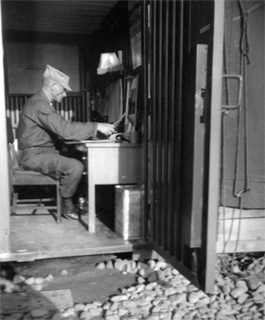
Norb's mother and his brother Leonard and his family came for a visit, and they again planned a trip to see a bull fight. Leonard's wife and Virginia stayed back, and Virginia still regrets never seeing a bull fight.
In early September, the battalion was given a two week leave, and the couple returned to Iowa. They were taken back to El Paso by Norb's sister and husband, Sophia and Irvin Heckenliable, who brought Virginia back to Iowa when the battalion shipped out. Thus, 3 of Norb's 6 siblings were able to visit him while he was in the service.
Battery B, 2nd Missile Battalion, 71st Artillery, a group of more than 700, left Texas September 15 by train to Seattle, where they boarded the USS JC Breckenridge September 23. Their destination was classified but they knew they were headed to the Far East. They crossed the equator September 30. Two submarines surfaced. Their ship anchored, and everyone was called to deck. Each person was issued a "death pack" - a needle filled with a deadly serum - and they were told that if the ship was entered, each man was to take the label off the pack, put it on his palm, then stab himself with the needle. There were to be no survivors. After three tense days, a US destroyer arrived and accompanied their troop ship to its destination.
The Breckenridge docked at Keelung, Taiwan (Formosa), on October 8, 1958, to off-load the troops. Chinese Nationalist forces, under the command of Generalissimo Chiang Kai-shek, had retreated to the island of Taiwan in 1949, a few miles off the Communist Chinese mainland. On August 23, 1958, the Communists artillery had unleashed a barrage that is said to be the largest single artillery barrage in history on the Nationalist-held islands of Kinmen and Matsu. The barrage lasted 44 days. Because of this attack and growing concerns that the Mainland Communists would overrun the Nationalists, the U.S. had begun to increase its support to the government on Taiwan. Aid from the Navy and Air Force already included several squadrons of F-104 aircraft with Sidewinder Missiles and a Matador ground-to-ground missile system.
The 2nd Missile Battalion (Nike-Hercules) had been activated at the height of the Second Taiwan Straits Crisis of 1958. Norb's battalion was sent to defend Taiwan's capitol, Taipei, from any air attack from the Communist Chinese mainland. While the unit was being transported to Taiwan, two American construction companies and engineer units of the Chinese Nationalists initiated the preparation of four tactical missile sites and had started to level tea fields for the firing batteries on the mountain tops west of Taipei. The equipment, which had been shipped separately, and troops were moved in as soon as they arrived. Norb said they worked 7 days without showers while setting up the base, and were finally taken to an Air Force base to shower. By Oct. 22, the base was operational. In less than 60 days, they had been integrated into a battalion-size unit of 700 men from two existing units, transported to Taiwan, and assumed a tactical air defense mission in a hostile environment.
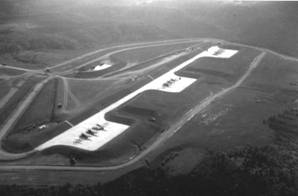
Officers lived in quonset huts, while the others lived in tents, sleeping on cots. They had one change of clothes. It was all very open, and Norb's locker was broken into; his clothes and the pictures he'd taken were all stolen. Shoe, a Chinese man, was the house boy for the cooks and kept the barracks clean. Shoe worked for the Army, and was so poor he would rummage through the garbage cans to take food home. The surrounding area was extremely destitute, and Norb said you could smell a town 5 miles before arriving there, as the garbage and human waste was out in the open. Residents washed their clothes and used water for cooking from rivers shared by water buffalo.
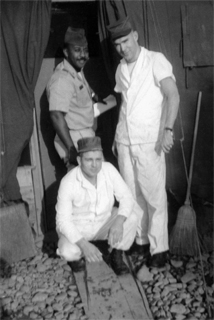
The Mess Tent included stoves, grills, and refrigerators powered by generators. It would reach 120 degrees inside the tent while they were working. Meals were fairly simple - hamburgers, ham, chicken, various cuts of beef, sliced potatoes with cheese sauce. Beef was shipped to them in swinging halves, and had to be cut up by the cooks. For Thanksgiving, the Chinese Nationalists brought in 27 live turkeys, arriving the night before the meal. The cooks spent the entire night killing, dressing, and cooling the turkeys, then making the full meal which also included shrimp cocktail, baked ham, mashed potatoes, sweet potatoes, bread dressing, gravy, peas, corn, relishes, hot rolls, pumpkin pie, mincemeat pie, and fruit cake.
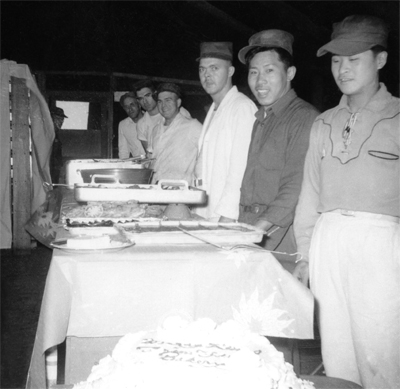
While on maneuvers, the cooks used field stoves, which were powered by a propane tank that was pressurized and had to be pumped up. In addition to the food they brought out to the field, the Mess Sergeant also had food buried in the ground along the way so they wouldn't have to return all the way to the base camp if they ran out of supplies.
Even with these primitive cooking conditions, Norb only remembers two times where something spoiled. Once, he had made a bread pudding which was set on the open racks, called Square Heads, to cool down and was to be put in the refrigerator by the next shift. It didn't get refrigerated, and when served, people got sick. Another time, he served left-over liver to a group which had missed the regular meal, and the liver made them sick.
Norb's base was only 80 miles from Tokyo, Japan, and he hoped to get there on a leave. His special desire was for a cashmere suit which was very inexpensive there. He never got the chance for that leave. In the fall of 1959, Norb received word of a family emergency. He went to his Mess Sgt., and he reported to the Captain, who told him, "You belong at home more than you belong in the service". The Red Cross helped make arrangements, and he left Taiwan in a 2-seater plane. He went from Guam, to Hawaii, and to California in a larger plane. He had no money when he arrived in California, and he hitchhiked with truckers to Chicago where he had to sign in to be relieved of duty. After three days of no food, he left Chicago and returned to Manning.
Pfc. Stoberl remained in the reserves until December, 1963.
Although Norb was the only one in his immediate family to serve in the US military, his grandson
Justin Putz served as an Army medic; Sgt. Putz was stationed in Seattle.
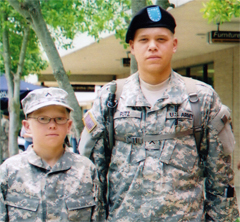
Norbert's brother, Lyle Stoberl, served in the Iowa National Guard for a short term of a year-plus around 1952 until he suffered a severe ear infection during a training drill causing near deafness and his early discharge. Lyle, his wife, Mary, and their daughter, Denise, first lived in the Stoberl home that Norbert now lives in but later moved to Stuart, Iowa.
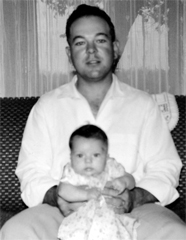
Virginia, who is from Audubon, has a long list of relatives who have served from the Spanish-American War, through present. Her grandfather, John Nielsen Christensen, served in both the Spanish-American War and WWI. Virginia's Uncle Hans Christensen served in the Army during WWII, and was a part of the CCC (Civilian Conservation Corps) where he helped build roads in the Springbrook State Park near Guthrie Center. Her uncles, Robert Christensen and Nels Christensen also served in the Army during WWII. Two of Virginia's brothers served during the Korean War period; Franklin Jorgensen was in the Navy, and Hans Peter "Junior" Jorgensen was a paratrooper in the Army.